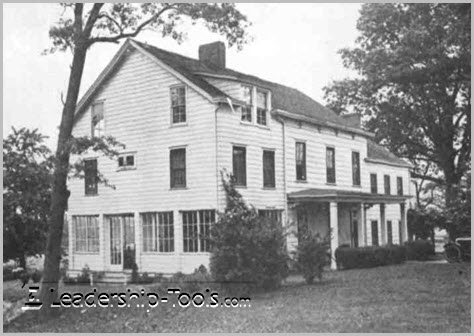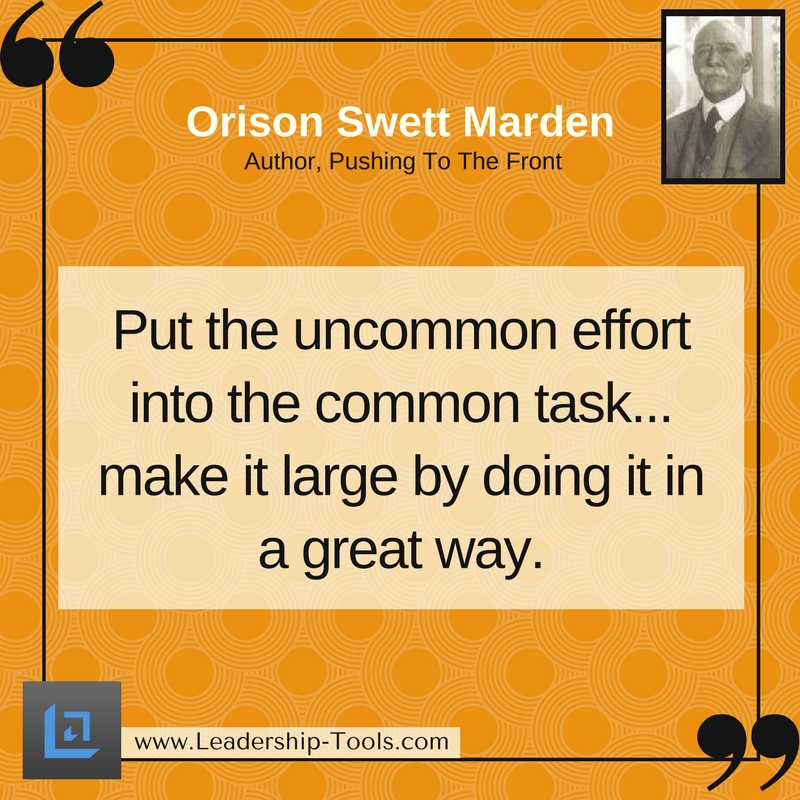- Home
- Self Growth Library
- Orison Swett Marden Chapter XXI
Orison Swett Marden Chapter XXI
A New Friend, And A New 'Success"
The Life Story of Orison Swett Marden Chapter XXI:
In an unpublished article on the so-called misfortune plays in our lives, Doctor Marden says:
"You
are bigger than anything that can happen to you. If you have had
misfortunes, losses, setbacks, failures, you can rise above them. Make
up your mind that you will; that you are coming back. Keep saying this
to yourself, I am coming back and I am coming back strong,' and you will
be surprised to find how your courage and confidence will rise to the
occasion."
He must have repeated these words many times to himself when, a short time before the World War, he began to set the stage for his own "comeback." Although much hampered by financial losses suffered through the failure of Success Magazine he retained his editorial office.
Gathering a remnant of his former staff about him, he went on writing books and articles and managing his farm on Long Island. All the time he was holding fast to his vision of a new magazine that was to be greater than the old — a magazine that would "nurse his vision," as he would express it, — and he lost no opportunity for advancing his plans.
In 1917, the year of America's entrance into the War, these plans began to take tangible form. By what some would call the intervention of Providence, a new friend was now brought into Marden's life. The highly important part which this friend played in the realization of his vision gives an added interest to the circumstances that led to their meeting.
Some distance from the Marden home, on their farm, there was a smaller house, called Fairview Cottage. Facing Long Island Sound, the cottage had a beautiful view, and the Mardens were able to rent it out typically from April or May to November.
One afternoon a Mr. and Mrs. Jerome Smith called to look at the cottage, and Mrs. Marden invited them to sit on the verandah and enjoy the view while she prepared afternoon tea. Doctor Marden joined his wife and the two strangers on the verandah. After a delightful hour, the visitors took their leave.
Months afterwards, Mrs. Smith called on a friend in New York, who, in their conversation, happened to mention the name of Mrs. Marden, whom she had recently heard sing at a concert, and was very enthusiastic about her voice. Mrs. Smith, much interested, told her friend of her visit to Fairview Cottage, and expressed an earnest desire to see the Mardens again.
A few days later, Mrs. Marden was called to the telephone, and a voice at the other end inquired if she remembered Mrs. Smith and her husband who had called at Fairview Cottage the previous summer.
Mrs. Marden remembered very well. Mrs. Smith then explained that a friend of theirs, a Mr. Lowrey, from Chicago, was having dinner with them; that he was a great admirer of Doctor Marden and his work, and wanted very much to meet him. Might they call on Doctor and Mrs. Marden that evening, after dinner, and take their friend with them?
They did so, and this was the beginning of Frederick C. Lowrey's connection with the New Success Magazine. It was also the beginning of one of those heaven-born friendships which illumine the dusty highways of our common life with a gleam of romance.
Animated by a profound devotion to the same high ideals of service, Marden and Lowrey each felt that he had found a kindred spirit, and their friendship ripened into that perfect relationship of which Balzac says: "Kindness given and received aright, and knitting two hearts into one, is a thing of Heaven, as rare in this world as perfect love; both are the overflow of only very rare and beautiful souls."
Prominent among Chicago's leading businessmen, Frederick C. Lowrey had an altruistic interest in young people, especially in boys and in young men starting to make their own way in life. His hobby was to lend those who needed it a helping hand in the way that would most benefit them.
"You may almost reach your goal, only to be tripped and thrown to earth. But you must get up and run again, and keep on running so long as strength is within you."
- O.S. Marden
He had been a reader of Success and no one was more surprised or grieved than he when it ceased publication. He felt that its disappearance was a national loss. In his own way he had been a quiet worker in promoting its circulation, for he believed that no other periodical was doing more good, had a wider field of usefulness, or was more needed than Success. Yet, although he had been an active promoter of Marden’s books and of the magazine, the Chicago merchant and manufacturer was so modest and unassuming that, up to that time, he had not even made himself known to the editor-author.
He was a man who, in ways other than his particular hobby of anonymously helping young people, literally obeyed the Scriptural injunction — not to let his left hand know what his right hand did. When, however, he visited his friends in New York, he felt that the time had come when he must get in direct personal touch with Doctor Marden. He believed there was no other way in which he could serve a larger number of people than by helping to put Success back on its feet again.
The editor himself had been working steadily toward that end; his plans were laid, his course mapped out. All that was necessary to put the machinery in motion was the capital he had, thus far, not been able to get. The War had made American business men panicky.
Europe had gone out of business in the ordinary sense. As one country after another was drawn into the whirlpool, war became the business of life. Commerce and all other peaceful avocations were interrupted or suspended and men's energies were almost wholly directed toward destruction.
"Ability is what you're capable of doing. Motivation determines what you do. Attitude determines how well you do it."
- Lou Holtz
Orison Swett Marden Chapter XXI , continued...
During the first year the results in America were very grave. Business slumped lower and lower, unemployment was acute, and the future was still more threatening.
No one thought of investing in new enterprises. The problem was to keep established business financed and going. Then, suddenly, the situation was reversed.
As the struggle grew in intensity, every man who could bear arms was forced into it, and production in Europe, so far as the male population was concerned, practically ceased. America's production was correspondingly increased to meet the European deficit. She became the productive center of the world, the one great neutral country to which all the warring European nations turned to for supplies of every kind.
By 1917 America was on the crest of a wave of prosperity unique even in the history of the richest nation on earth.
During the first year the results in America were very grave. Business slumped lower and lower, unemployment was acute, and the future was still more threatening.
No one thought of investing in new enterprises. The problem was to keep established business financed and going. Then, suddenly, the situation was reversed.
As the struggle grew in intensity, every man who could bear arms was forced into it, and production in Europe, so far as the male population was concerned, practically ceased. America's production was correspondingly increased to meet the European deficit. She became the productive center of the world, the one great neutral country to which all the warring European nations turned to for supplies of every kind.
By 1917 America was on the crest of a wave of prosperity unique even in the history of the richest nation on earth.
Then came the event that from the first had been foreseen and could no longer be avoided. America declared war against Germany, and joined the Allies in Europe. Throwing all her resources in men, money, and materials into the Titanic struggle, she soon had more than a million young men on the battlefields of France, while other millions were being drafted and trained to be sent there, if necessary.
Prices had soared to unheard of heights, and from the President down to the humblest artisan, economy and thrift were the watchwords.
Every family had cut expenses down to a minimum, not only because of the tremendous cost of the war, but also because all were anxious to contribute what they could to relieve the terrible suffering of the famished and starving peoples of Europe. In short, every nerve of the nation was being strained to win the war, to relieve suffering, and to restore peace to a distracted and war-broken world.
Doctor Marden was solemnly warned that, at such a time, under such conditions, it would be worse than folly to attempt to start a magazine. It was pointed out that the price of writing materials, ink, and paper, was especially exorbitant, while printing paper, owing to the difficulty of getting the pulp from which it was manufactured, was so scarce that the supply for existing magazines had to be cut. Everything seemed to be against the venture.
Lowrey, however, urged Marden to give him the privilege of assisting in rebuilding and restoring Success to its former place.
Doctor Marden naturally hesitated to let his new friend invest his money in anything so risky as magazine publishing. Nevertheless, despite the well-meant warnings of other friends to the contrary, he felt that the psychological moment for the venture had arrived. He believed that the mental and spiritual need of the time would cause people to respond even more quickly than before to the stimulus and encouragement of Success.
Accordingly, backed by the sympathy and financial support of his friend, he again entered the magazine field.
The first number of the New Success appeared in January, 1918. The magazine had unusual problems and difficulties to meet in that first crucial year of its life, when the Allies were in a death grip with the enemy.
Many established publications failed in those terribly strenuous months before the Armistice; but Success held its ground and grew, justifying its editor's vision and foresight. The people wanted it, and he was happy in the knowledge — brought by his daily mail — that the message which came from his heart went straight to the hearts of Success readers.
As one who knew the magazine well said: "Doctor Marden probably got closer to the hearts of the people in the homes of this country than any other man in the magazine field. No other magazine has ever become so intimately associated with their everyday affairs as his."
It began to look as if his dream of a greater magazine than the old
Success might come true. In the latter part of 1923, the year before
Marden made his last visit to California, Colonel William T. Sheehan,
editor of the Montgomery Advertiser, a leading daily of Alabama, had an
editorial in his paper entitled, "Doctor Marden Succeeds," in which he
said:
"In some way a copy of Doctor Marden's Success Magazine dropped into the office yesterday to remind us that the good Doctor has staged a comeback.
Twenty years ago the old Success Magazine was hitting on all cylinders and appealing to an ever-increasing number of readers who liked the way the editor promised them every good thing they wished for — if only they would work hard and save their money, be honest, and study. Then an amazing thing happened — Success failed!
A good many thousands of people regretted the news, not only on account of the loss of a periodical that interested and stimulated them, but also because the failure suggested a weakness in Doctor Marden's philosophy. Was all that he had been saying about the successful life true, or had he overdrawn some of his pictures? Or had Doctor Marden simply failed to observe his own formulas?
 Dr. Marden's Farmhouse, Glen Cover, Long Island
Dr. Marden's Farmhouse, Glen Cover, Long IslandIt was painful and discouraging to see the foremost interpreter of the rules of success fail in the greatest single undertaking of his career.
But Doctor Marden did not stay out of the field very long. Although the years were advancing rapidly, he bade us to remember an item in his formula which we had forgotten with the downfall of Success. He had been saying, in the old publication, that success is often elusive and difficult. You may almost reach your goal, only to be tripped and thrown to earth. But you must get up and run again, and keep on running so long as strength is within you. Be patient and courageous, and you will have your reward, even though it may be delayed.
A few years ago — maybe some five or six years ago — Success Magazine was revived with Doctor Marden as its chief. Today, Success looks as if it has come to stay. Its pages are occupied by a goodly volume of high-priced advertising, and the publisher says, in his monthly chat with the flock, that Success is on its way to a million circulation in 1924!
Good! We hope Doctor Marden's paper reaches the million mark in short order. He deserves the patronage that is coming his way. If he gets a million circulation soon, it will make him rich, very rich. And then the Doctor can speak with all the more assurance when addressing boys and girls and men and women when he says to them, "If at first you don't succeed, try, try again!" He's seventy-three now — but he's a New Hampshire Yankee, and he will win.
Before increasing illness compelled him to lay aside his work and take a too long deferred rest, the "New Hampshire Yankee" had the joy of knowing that he had won. He was filled with gratitude for what had been accomplished, and for the future of the magazine that was so dear to him. There was nothing of sadness in word or manner when he bade his staff farewell, for he was looking forward to a happy return.
All were gathered in the spacious general office of the Success headquarters at 251 Fourth Avenue, New York, for afternoon tea. Although he was not a tea drinker himself, this pleasant social function had been established by Doctor Marden for the benefit of the employees, who came to look forward to it as children in school do to a recess period.
Visitors who happen to drop in around the tea hour enjoy it as much as do the office staff. On this occasion it took on the appearance of a tea banquet, a table being spread and made gay with brilliant-hued flowers, while ice cream, cake, and other confections were added to the regular menu.
No one associated with Doctor Marden in his work will ever forget that day, January 26, 1924, for it was his last day with them. They were never to see him again. As he rose from his seat at the head of the table, smiling and happy, in spite of physical weakness, and a little embarrassed by the flattering speeches of his co-workers, his voice trembled slightly when he attempted to reply in his old cordial manner. At the close, when he was presented with a beautiful bouquet of red roses — one for each year that had passed since the birth of the old Success, in Boston, in 1898, - his emotion for a moment overcame him.
An enthusiast, a dreamer who had made his dreams come true, his devoted wife by his side holding in her hands the red roses, symbol of his victory, — this was the picture that stamped itself on the minds of the men and women of the Success organization that day as they bade their Chief Godspeed!






